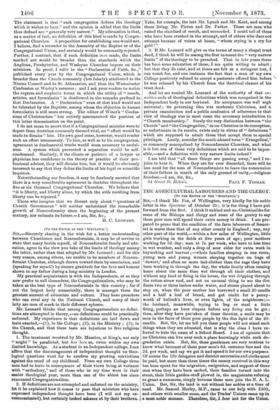[TO THE EDITOR OF TUB 'SPECTATOR.")
SIR,—Sincerely sharing in the wish for a better understanding between Churchmen and Nonconformists, it may be 91 service to state that many beside myself, Of Nonconformist family and edu- cation, agree in the view you take of the limits of theology among the latter, rather than that adopted by Mr. Leonard ; and for this very reason, among others, are unable to be members of Noncon- formist Churches, although drawn toward them by association, and (speaking for myself) by sincere gratitude for the love and-honour shown to my father during a long ministry in London.
My practical acquaintance is with the Independents, or as they now prefer to call themselves, the Congregationalists, who may be taken as the beet type of Nonconformists in this country ; for if not the largest body numerically, there is amongst them the greatest amount of education and culture. They have preachers who can rival any in the National Church, and many of their laity are men of mark in their different spheres.
Mr. Leonard thinks that among Congregationalists no defini- tions are attempted in theory,—no definitions could be practically enforced. My experience is that definitions are laid down and tests exacted,—(1), in the College ; (2), in the Ministry ; (3), in the Church, and that these tests are injurious to free religious thought.
1. The treatment received by Mr. Maurice, at King's, not only " might " be paralleled, but has been so, twice within my own limited knowledge. As a student in an Independent college, lean affirm that the discouragement of independent thought on theo- logical questions went far to confirm my growing convictions against the creed of my childhood. From my own College three men had to leave in consequence of their views being at variance with "orthodoxy," and of those who in my time were in their senior theological year, more than one of the ablest has since renounced Congregationalism.
2. If definitions are not attempted and enforced on the ministry, let it be explained how it comes to pass that ministers who have expressed independent thought have been (I will not say ex- communicated), but certainly looked askance at by their brethren.
Take, for example, the late Mr. Lynch and Mr. Kent, and among those living, Mr. Picton and Dr. Parker. These are men whcr raised the standard of revolt, and succeeded. I could tell of those who have been crushed in the attempt, and of others who dare not attempt because of voices at home, "whose crying is a cry for gold !"
3. If Mr. Leonard will give us the terms of many a chapel trust deed, I think he will be among the first to resent the "very narrow. limits" of the theology to be preached. That in late years there has been some relaxation of these, I am quite willing to admit ; but that they do exist, and at times are felt as a stringent test, I can vouch for, and can instance the fact that a man of my own College positively refused to accept a pastorate offered him before- he was released by his Church from the doctrinal clauses of his trust deed.
And let me remind Mr. Leonard of the authority of that un- written code of theological definitions which was recognised in the- Independent body in our boyhood. Its acceptance was well nigh universal ; its governing idea was moderate Calvinism, and a private examination and a public confession of adherence to that view of theology was in most cases the necessary introduction to- "Church membership." Surely the very distinction between "the Church" and "the Congregation," so un-Christian in its conception,, so unfortunate in its results, exists only in virtue of "definitions "' which are supposed to admit those that accept them to special privileges. Lastly, consider the much-abused term "Evangelical," so commonly monopolised by Nonconformist Churches, and what is it but one of those very definitions which are said to be impos- sible,—and a definition with very narrow limits indeed ?
I am told that "all these things are passing away," and I re- joice to hear it. When they are for ever discarded, there will be- less need for the sons of Nonconformists to leave the communion of their fathers in search of the only ground of unity,—religious freedom.—I am, Sir, &c.,


































 Previous page
Previous page